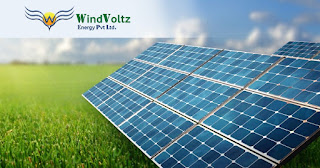India stepped up efforts at positioning itself as a global climate leader at the first conference of the International Solar Alliance (ISA) Sunday, with Prime Minister Narendra Modi pledging to generate 175 gigawatts (GW) of electricity from renewable energy sources by 2022, including 100 GW from solar and 60 GW from wind. India has launched the “world’s biggest renewable energy programme” with this target in mind, he said.
Speaking at the conference, which India co-hosted with France, the Prime Minister also referred to the Vedas. “For millions of years, the sun has been giving light and life to the world. From Japan to Peru, France to Rome, Egypt and the eastern civilization –the sun has been given utmost importance,” he said.
“But in Indian viewpoint, for thousands of years, the sun has been the unparalled centre. In India, the vedas for thousands of years, have considered the sun the soul of the world. In India, the sun is considered the nourisher. Now that we are looking for a way to deal with the challenge of climate change, we have to look back at ancient view of balance and perspective,” he added.
Elaborating on India’s target, Modi said, “Of the target for solar energy generation, we have already achieved 20 GW installed solar power.” He also announced that 500 training slots will be created for member countries and a solar technology mission launched to lead R&D in the sector. The ISA is the first international treaty-based organisation headquartered in India. It was established following the Paris Declaration as an alliance dedicated to the promotion of solar energy among its member countries. Of the 121 countries associated with ISA, 61 have joined the alliance and 32 have ratified the framework agreement.
In his speech, French President Emmanuel Macron took a swipe at US President Donald Trump for backing out of the Paris climate agreement without naming him. Turning to Modi, Macron said, “Mr. Prime Minister, you made a dream and we did it. It was about this International Solar Alliance. It was two years ago, it was just an idea at that time and we decided all together to act very concretely and today is a big change.”
Referring to a group of rural women solar engineers ‘solar mamas’ who had performed earlier, Macron said: “Our solar mamas, we just listened to, didn’t wait for us. They started to act and deliver concrete results. They didn’t wait, and they didn’t stop, because some countries decided to just leave the floor, and leave the Paris agreement.”
“Because they (solar mamas) decided it was good for them, for their children, grandchildren, they decided to act and keep acting and that is why we are here in order to act very concretely.”
Speaking earlier, External Affairs Minister Sushma Swaraj said the ISA is not only a testament to India’s unwavering faith in multi-lateralism but “also commitment on all of our parts to a better, sustainable and greener future.”
Further, she said: “A world in which a minority appropriates the vast majority of the world’s resources is not a sustainable paradigm. A more equitable socio-economic order that respects sustainability is essential if the future is to be defined by peace, prosperity and progress. It is my fervent hope that the ISA will serve as a laudable vehicle towards this goal.”
Swaraj used five Sanskrit names for the “Sun God” while speaking of India’s push for solar energy. “I would like to bow before the Sun God and address him by five different names in Sanskrit, ‘Om Suriyaya namaha, om Adityaya Namaha, om Dinkaraya namaha, om Divakaraya namaha, om Bhaskarya namaha’…this means ‘Oh Sun God, we bow before you, you illuminate the external and the internal world and you are the best to be adored and worshipped. May you bless us…,” she said, with folded hands.
Speaking to reporters later, T S Tirumurti, secretary (economic relations), Ministry of External Affairs, said that the solar technology mission announced by Modi was a “path breaking initiative” with an international focus to “take the lead internationally in solar energy development”.
In his speech, Modi called for concessional and less-risky finances for raising the share of solar electricity available for such projects to achieve the ISA target of over 1000 GW of solar generation capacity and mobilisation of investment of over $1 trillion by 2030. “We have to increase the share of solar in energy mix,” he said.
Modi also presented a 10-point action plan that included making affordable solar technology available to all nations, raising the share of electricity generated from photovoltaic cells, framing regulations and standards, providing consultancy support for bankable solar projects and creating a network of centres for excellence.
Macron, meanwhile, announced a common risk mitigation mechanism to be put in place before the end of 2018. The mechanism was developed by a taskforce comprising the Council on Energy, Environment and Water, Terrawatt Initiaitve and The Currency Exchange Fund (TCX).
Tirumurti said the ISA was attended by 21 heads of states and heads of government, several top ministers and bureaucrats, apart from participants from multilateral banks, and the United Nations. “It is evident that there has been a huge surge in interest in joining the ISA, and the commitment at the highest level of these founding states, towards clean, affordable, appropriate and sustainable energy,” he said.
As many as 62 member-nations committed that they will increase the share of solar power in their energy mix to deal with climate change and provide energy to underprivileged in the society. The Delhi Solar Agenda was launched at founding summit, which states that countries will pursue an increased share of solar energy in the final energy consumption in their respective national energy mix to tackle global challenges of climate change.
To Install Solar in Your Home or Office, Just Contact Us.
www.windvoltz.com
Email :support@windvoltz.com
Mobile: +91 8281101017
Phone: 0471 2551799
Location :-
Wind Voltz Energy Pvt. Ltd
Krishna, T.C-17/4194, GRA-170,
Gowreeshapattom, Pattom,
Thiruvananthapuram-695 004












